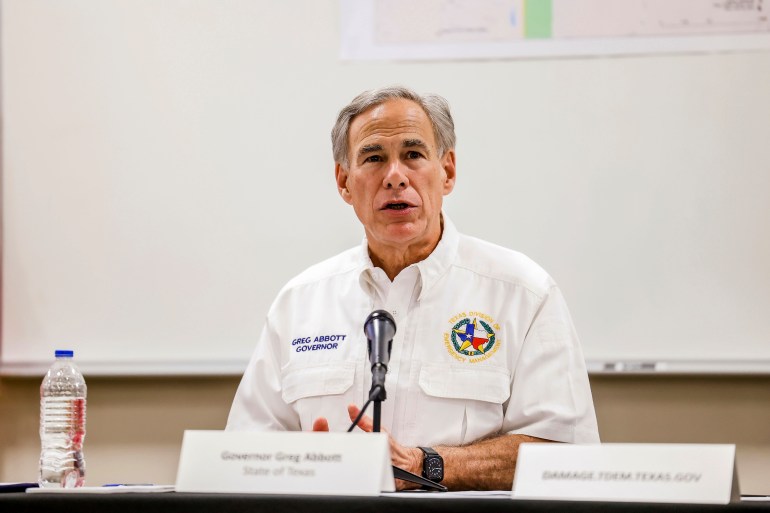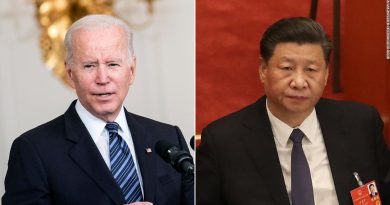US Justice Dept sues Texas over floating Mexico border barrier
The United States Department of Justice has filed a lawsuit against the state of Texas, calling for the removal of a floating border barrier that has raised territorial and humanitarian concerns.
The lawsuit on Monday comes after Texas Governor Greg Abbott rejected an appeal last week to voluntarily remove the barrier, which stretches across 305 metres (1,000 feet) of the Rio Grande.
“We allege that Texas has flouted federal law by installing a barrier in the Rio Grande without obtaining the required federal authorization,” Associate Attorney General Vanita Gupta said in a statement on Monday.
In addition to the safety concerns the barrier raises, Gupta alleged that the floating border wall “risks damaging US foreign policy” and hindering navigation.
Mexico already filed a complaint with the US government earlier this month, accusing the structure of violating border treaties signed in 1944 and 1970.
The barrier — a chain of giant, orange buoys anchored into the riverbed outside of Eagle Pass, Texas — is one of the latest efforts by Texas’s Republican governor to fortify the US-Mexico border, in response to what he considers lax immigration policy at the federal level.
Abbott, an outspoken critic of Democratic President Joe Biden, issued a letter earlier on Monday seeming to invite the lawsuit: “Texas will see you in court, Mr President.”
He justified the floating border wall as a necessary deterrent to irregular migration.
“If President Biden truly cared about human life, he would enforce federal immigration laws,” Abbott said. “In the meantime, Texas will fully utilize its sovereign authority to respond to the border crisis Biden created.”

The number of irregular crossings from Mexico into the US has been on the decline since the May expiry of Title 42, a controversial COVID-era policy that allowed border officials to turn away asylum seekers without processing their claims.
US Customs and Border Protection found that irregular crossings along the southwest border dropped by nearly 30 percent from May to June — from 206,702 “encounters” to just 144,571.
But the policy’s expiration coincided with new consequences for irregular border crossings. Migrants and asylum seekers who enter the US through informal means could face a five-year ban from the country, as well as potential criminal prosecution.
The Biden administration has also called for asylum seekers to first seek refuge in the countries they travel through. Only if they are rejected can they generally seek asylum at the border.
On Monday, the White House cited its new immigration efforts as it blasted Governor Abbott’s floating border as “unlawful”.
“The one person who is sowing chaos is Governor Abbott,” White House Press Secretary Karine Jean-Pierre said of the situation along the Rio Grande. “He’s making it harder for the people who are supposed to work to protect our border. That’s what he’s doing.”
She denounced the floating barrier as a “political stunt” and accused Abbott of pursuing “really cruel, unjust, inhumane ways” of deterring migration.

The floating barrier comes as part of Operation Lone Star, a multi-pronged Texas initiative launched in 2021 under Abbott.
It includes bussing migrants and asylum seekers to predominantly Democratic cities and deploying troops from the state National Guard and the Texas Department of Public Safety to guard the border.
“Operation Lone Star continues to fill the dangerous gaps left by the Biden Administration’s refusal to secure the border,” the governor’s office said in a 2022 press release.
The initiative claims to have detained 394,200 people at the border and made more than 31,300 criminal arrests as of July.
But Operation Lone Star has also sparked human rights concerns, as asylum groups denounce the militarisation of the border and heavy-handed policies.
Last week, a letter leaked to the media allegedly showed correspondence between a trooper with the Texas Department of Public Safety and a superior officer, expressing concern about the tactics used in Operation Lone Star.
The trooper — identified as Nicholas Wingate — described being ordered to push migrants and asylum seekers back into the Rio Grande and deny them water.
He also recalled injuries sustained as migrants and asylum seekers found themselves facing the razor wire that lines the river banks.
“I believe we have stepped over a line,” he said of the operation’s tactics.
Work on the floating border barrier — comprised of buoys more than 1.2 metres (4 ft) in diameter — began earlier this month. It was announced as part of Operation Lone Star in June, with Steve McCraw, director of the Texas Department of Public Safety, estimating its cost as $1m.
In its press release on Monday, the Department of Justice reiterated its concern that the barrier would harm those who use the waterway.
“We must all recognize that there are laws and policies in place — both domestic and international — to ensure the safety and security of everyone working, living and traveling along the river,” US Attorney Jaime Esparza said.
“These laws cannot be ignored, and my office will take and support the appropriate legal action to uphold them.”




